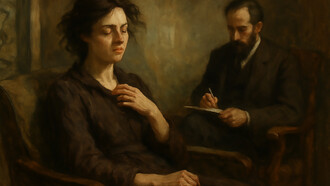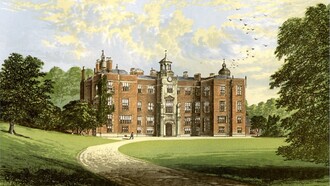Sarah Robinson was born in West Layton, Yorkshire, in 1723 to Matthew Robinson and Elizabeth Drake Robinson. She married George Lewis Scott in 1751. However, a year later, her father removed her from her husband's home without providing any financial support. Through her sister, Elizabeth Montagu, Sarah became acquainted with Lady Barbara Montagu. Sarah joined Lady Barbara in Bath, where they lived modestly and actively worked to help the poor establish cottage industries. Sarah Scott's novel, "Millenium Hall," is often regarded as a fictional representation of the Bluestocking Ideas, a group that included Mary Montagu, Sarah Scott, Sarah Fielding, and Hannah More.
When considering the concept of utopia, we often turn to male-authored accounts such as Thomas Moore's "Utopia" or Plato's "Republic." However, these ideal worlds often suffer from undermining or corruption. In contrast, "Millenium Hall" (1762) maintains its consistency throughout, even inspiring its male visitors. It is important to note that the all-female space depicted in the novel is not intended to be viewed as a convent, nor is it a complete retreat, as evidenced by the male narrator's presence. Instead, it represents an intentional community.
The novel takes the form of an epistolary travelogue written by an anonymous gentleman and his companion, Mr. Lamont. They unintentionally discover the grounds while seeking shelter following a carriage accident. The anonymous gentleman has been advised to retreat to the countryside in order to restore his health and pursue a "good life" characterized by material self-sufficiency and independence from the corrupt commercial and political worlds.
The novel suggests that one should prioritize universal virtue over the desire for material goods. However, for a modern-day audience, this perspective raises concerns, as the narrator has a background as a plantation owner in Jamaica. While some eighteenth-century writers expressed discomfort or condemnation of slavery, Sarah Scott seems to associate the plantation owner with the English gentleman, portraying them as resigned to economic dependence on this income and relegating colonial reality to the background.
Among the residents of Millenium Hall, one of the characters, Mrs. Maynard, shares the backstories of the women with the visitors. Lady Melvyn is described as having married a man who is intellectually inferior to her, as per her parents' wishes. She spends her life trying to make him look good. After Lady Melvyn's death, her husband remarries, and the new wife convinces him to send their daughter to boarding school. It is there that she meets Miss Mancel. Upon returning home, a marriage is arranged for Miss Melvyn with Mr. Morgan, a man she does not like. Under duress, she reluctantly complies and marries him. Miss Mancel finds refuge with Lady Lambton but eventually falls in love with Lady Lambton's son, Sir Edward. Miss Mancel then leaves to stay with Mrs. Thornby. When asked about her past, Miss Mancel mentions that her parents were forced to give her up. Later, Mrs. Thornby reveals that she is Miss Mancel's mother. Upon Mrs. Thornby's death, she leaves her daughter £40,000 in her will. Following the death of Mr. Morgan, Miss Mancel and Lady Melvyn pool their resources and move into a large house. They establish schools for the poor and actively help the local community.
Another resident of Millenium Hall is Lady Mary Jones, the daughter of the Earl of Brumpton. After the death of her parents, Lady Mary goes to live with her aunt, Lady Sheerness. In her innocence, Lady Mary falls for Mr. Lenman's proposal and is on the verge of eloping to Scotland with him when she suffers a severe carriage accident. During her recovery, she discovers that Mr. Lenman is already married. Lady Sheerness passes away with significant debt, and Lady Brumpton takes Lady Mary in, where she remains for several years until Lady Brumpton's death. Lady Brumpton leaves Lady Mary an inheritance of £10,000. In Tunbridge, Lady Mary meets Mrs. Morgan and Miss Mancel and decides to accompany them to Millenium Hall. Another woman who joins them at the hall is Miss Selwyn. Despite her father's limited fortune, Mr. Selwyn raises his daughter in a refined manner. Once she reaches adulthood, they move to London and come into contact with Lady Emilia Roberts, who introduces them to Lady Sheerness and Lady Mary. After her father's passing, Miss Selwyn lives with Lady Emilia until her death, at which point Lady Mary convinces her to stay at Millenium Hall.
The women residing in Millenium Hall have chosen to retreat from the outside world due to the negative experiences they have encountered, such as oppressive husbands, poverty, and challenging circumstances. The novel portrays how chance encounters and circumstances bring these women together as friends. In their intentional community, their domestic activities are guided by virtues and benevolence rather than profit-seeking. Each individual contributes according to their abilities, engaging in tasks like cooking, weaving, sewing, gardening, and more. They even operate a carpet factory to provide employment opportunities for the impoverished who lack work. The book emphasizes how benevolent commercial ventures can positively impact workers, with profits being invested in philanthropic endeavors.
The narrative suggests that benevolence brings joy not only to the recipients but also to the givers, becoming a driving force behind their actions. The male visitors acknowledge that mutual needs give rise to commerce and foster meaningful connections, forming the foundation of a harmonious society. Lady Mary Jones, in particular, challenges the notion that material desires are the primary motivation for social interaction, instead emphasizing the importance of friendship and understanding.
Millenium Hall, despite its positive aspects, does face criticism for perpetuating a class-based system where the women reside in the hall while the workers have their own cottages. Although the residents emphasize socialization, they largely isolate themselves from the world of men. While they do not condemn marriage and actively support young couples who wish to marry, none of the founders themselves desire to remarry. This suggests that they value their financial independence, which they maintain even after their investments in the community.
In the conclusion of the book, the narrator expresses admiration for Millenium Hall and a desire to replicate the commune's model for the betterment of the wider community. Mr. Lamont, the narrator's companion, also undergoes a transformation as he begins to appreciate the value of Christianity and aims to reform his previously libertine behavior. This supports the idea that active benevolence, rooted in personal moral principles, has the power to positively transform society.















